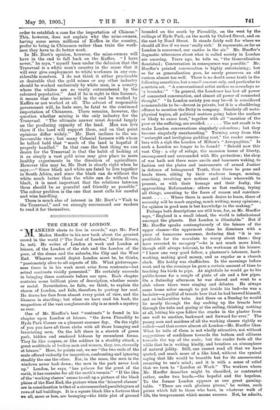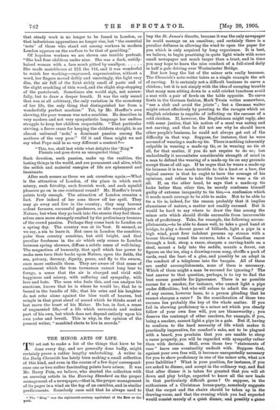THE CHARM OF LONDON.
MANKIND elects to live in crowds," says Mr. Ford Madox Hueffer in his new book about the greatest crowd in the world (" The Soul of London," Alston Rivers, 5s. net). He writes of London at work and London at leisure, of the London of the rich and the London of the poor, of the slums and the suburbs, the City and the West End. Whoever would depict London must be, he thinks, "passionately alive to all aspects of life. What picturesque- ness there is in his work must arise from contrasts—but actual contrasts vividly presented." He certainly succeeds in bringing these contrasts before our eyes. Each chapter contains some brilliant piece of description, whether scenic or social. Nevertheless, he fails, we think, to explain the charm of London, and fails, therefore, to portray her soul. He draws her face from almost every point of view, and the likeness is startling ; but when we have read his book, the magnetism of the vast conglomerate city is as much a mystery as ever.
One of Mr. Hueffer's best " contrasts " is found in his chapter upon London at leisure. " Go down Piccadilly to Hyde Park Corner on a pleasant summer day.,_ On the right of you you have all those clubs with all those lounging and luxuriating men. On the left there is a stretch of green park, hidden and rendered hideous by recumbent forms. They lie like corpses, or like soldiers in a stealthy attack, a great multitude of broken men and women, they, too, eternally at leisure." Here, be points out, we see " the two ends of the scale offered violently for inspection, confronting and ignoring steadily the one the other. For, in the mass, the men in the windows never look down ; the men in the park never look up." London, he says, " has palaces for the great of the earth, it has crannies for all the earth's vermin." " If the idea of the working classes' seems to call up a picture of the black plains of the East End, the picture when the • leisured classes ' are in consideration is that of a circumscribed parallelogram of rows of tall buildings. It is a square block like a fortress that we all, more or less, are besieging—the little plot of ground bounded on the south by Piccadilly, on the west by the railings of Hyde Park, on the north by Oxford Street, and on the east by Bond Street. It stands fairly well for where we should all live if we were ' really rich.' It represents, as far as London is concerned, our castles in the air." Mr. Hueffer's dogmatic utterances about what is called society in London are amusing. Years ago, he tells us, " the Generalisation flourished ; Conversation in consequence was possible." Mr. Hueffer's printed conversation is highly entertaining ; but so far as generalisation goes, be surely preserves an old custom almost too well. There is no doubt some truth in the following assertions, but a small amount only, and particular to a certain set. " A conversational artist strikes us nowadays as ' a bounder.' " " In general, the Londoner has lost all power of connected conversation, and almost all power of connected thought." " In London society you may be—it is considered commendable to be—devout in private, but it is a shuddering offence to mention the Deity in company. Similarly all meta- physical topics, all political matters going below the surface or likely to cause heat," together with all " mention of the
poor or the suffering, are avoided The net result is to make London conversations singularly colourless ; but they become singularly unexhausting." Turning away from this " untaught and irreligious gadding rout," the reader remem- bers with a sigh the London of Milton's " Areopagitica." Is such a London no longer to be found ? " Behold now this vast City : a city of refuge, the mansion house of liberty, encompassed and surrounded with His protection ; the shop of war hath not there more anvils and hammers waking, to fashion out the plates and instruments of armed Justice in defence of beleaguered Truth, than there be pens and heads there, sitting by their studious lamps, musing, searching, revolving new notions and ideas wherewith to present, as with their homage and their fealty, the approaching Reformation : others as fast reading, trying all things, assenting to the force of reason and convince- ment Where there is much desire to learn, there of necessity will be much arguing, much writing, many opinions ; for opinion in good men is but knowledge in the making."
Perhaps both descriptions are still true, for, as Mr. Hueffer says, " England is a small island, the world is infinitesimal amongst the planets. But London is illimitable." But if Mr. Hueffer speaks contemptuously of the leisure of the upper classes—the uppermost class he dismisses with a piece of humorous nonsense, declaring that " it is un- profitable for the moralists to worry about them : they have reverted to savagery "—he is not much more kind, though still always tolerant, to the workman at his leisure. " I knew one very good fellow, a plasterer's labourer, hard- working, making good money, and as regular as a church clock. His bobby was chaffinches. In the mornings before work and in the evenings he gave a certain amount of time to teaching his birds to pipe. At nightfalls he would go to his public-house for a couple of pints of ale and a few pipes. On a Saturday afternoon he was shaved and went to a club where there were singing and debates. He always came home sober enough to put beside his bed—he was a bachelor—a pailful of treacle beer that he had brewed himself, and an indiarubber tube. And there on a Sunday he would lie nearly through the day sucking up the treacle beer through the tube and gazing at the ceiling, thinking nothing at all, letting his eyes follow the cracks in the plaster from one wall to another, backward and forward for ever." The young men and maidens of all the working classes rightly so called—and that covers almost all London—Mr. Hueffer likes. What he tells of them is not wholly attractive, not without suggestions of sordidness towards the bottom and silliness towards the top of the scale ; but the reader feels all the while that he is writing kindly, and breathes an atmosphere of natural jollity. Still, one cannot read all that we have quoted, and much more of a like kind, without the cynical saying that life would be bearable but for its amusements recurring to one's mind ; and it is with a sense of relief that we turn to " London at Work." The workers whom Mr. Hueffer describes might be classified, or contrasted rather, under two heads,—the hopeful and the hopeless. To the former London appears as one great gaming- table. " There are such glorious plums," he writes, such prizes which fall to those who have, in whatever walk of life, the temperament which means success. Not, he admits, that steady work is no longer to be found in London, or that industrious apprentices no longer rise, but " the essential ' note' of those who stand out among workers in modern London appears on the surface to be that of gambling."
Of hopeless workers we are shown one terrible portrait. "She had four children under nine. She was a dark, untidy- haired woman with a face much pitted by smallpox She made matchboxes at 2td. the 144, and it was wonderful to watch her working—engrossed, expressionless, without a word, her fingers moved deftly and unerringly, the light very dim, the air full of the faint sickly smell of paste and of the slight crackling of thin wood, and the slight slop-slopping of the pastebrush. Sometimes she would sigh, not sorrow- fully, but to draw a deeper breath. It was the only sound that was at all arbitrary, the only variation in the monotony of her life, the only thing that distinguished her from a wonderfully perfect machine." Yet, by Mr. Hueffer's own showing, the poor woman was not a machine. He describes in very modern and not very sympathetic language her endless struggle to keep her children respectable. " That particular striving, a fierce craze for keeping the children straight, is an almost universal note,' a dominant passion among the mothers of the very poor." Of it and them might we not say what Pope said in so very different a context ?— " This, too, shall last while what delights the Ring's Flaunts and goes down an unregarded thing."
Such devotion, such passion, make up the realities, the lasting things in the world, and are permanent and alive, while the selfish and material energies of life are ephemeral and inanimate.
After such scenes as these we ask ourselves again,—What is the attraction of London, of the place in which such misery, such frivolity, such feverish work, and such squalid pleasure go on in one continual round ? Mr. Hueffer's brush paints truly enough. The attraction of London remains a fact. Few indeed of her sons throw off her spell. They may go away and live in the country; they may become ardent farmers, successful gardeners, or idle worshippers of Nature; but when they go back into the streets they feel them- selves once more strangely exalted by the preliminary tremors of the crowd passion. Perhaps they come back to London on a spring day. The country was at its 'best. It seemed, as we say, a sin to leave it. But once in London the sunshine, paler than country sunshine, but still bright, and that peculiar freshness in the air which only comes to London between spring showers, diffuse a subtle sense of well-being. The magnetism of humanity, that spell which has power to make men turn their backs upon Nature, upon the fields, the sea, privacy, decency, dignity, peace, and fly to the swarm, once more enthralls them. They are aware of that sense of excitement which the true townsman cannot long bear to forego, a sense that the air is charged and vivid with happiness and misery, with suffering and sympathy, with love and hate. The man who feels this, and can analyse his emotions, knows that he is where he would be ; that he is bound in the bundle of life ; that his cries and his laughter do not echo alone against the blue vault of heaven, but mingle in that great sheaf of sound which he thinks must at last move the heart of his Maker. He has, in fact, a sense of augmented life,—of a life which surrounds and makes part of his own, but which does not depend entirely upon his own pulse and breath. This is why, in the opinion of the present writer, " mankind elects to live in crowds."







































 Previous page
Previous page